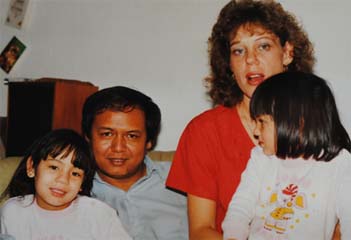|
Intermix.org.uk is a website for the benefit
of mixed-race families, individuals and anyone who feels they have a multiracial
identity and want to join us. Our mission is to offer a view of the mixed-race experience, highlighting icons, film, books, poetry, parenting techniques, celebrities, real lives and much more. Our online forums are a great place to meet others, ask questions, voice your opinions and keep in touch. Sign up for our monthly newsletter and delve into our pages. Want to join in? Become an Intermix member to take part: |
On Being Mixed
Nicola Han

I am part of a growing and more visible mixed-race population in Britain.
I don’t often use the term mixed-race to describe myself. I usually say I am half- Burmese. In fact most mixed people who I have met have
described themselves as, ‘half one thing and half something else’. My mother is half-English and half-Italian and was born and bred in Lancashire, and my father is ‘Bama’ or Burmese.
He moved to the UK to further his medical career in 1978 after successfully applying for membership with the British Medical Council from Rangoon, Burma’s old capital.
In 1901 John Nisbet, a British Civil Servant wrote in Burma Under British Rule and Before, " the children of unions, usually only temporary between Europeans and Burmese, are on the whole an unsatisfactory cross-breed". How glad I am that I wasn’t around when that statement was written, mixed relationships were seen as a threat to the stability of the British Empire back then. Fast forward to 21st Century Britain and mixed-race issues have entered the main stream media and are largely celebrated.
Being the only half-Burmese and half English person I knew, apart from my sister, was frustrating and isolating. Not because I wasn’t happy with who I was or that I felt like “an unsatisfactory cross breed” compared to ‘non-mixed’ peers but because I wasn’t the same as anyone else. And when you are young, you want to fit in and be the same.
My big sister, Gemma and I must have looked a little bit different to everyone else at our school in Padiham, Lancashire which was mostly English (white), but we weren’t different enough to stand out too much or experience many racist encounters.
However, we didn’t completely escape racist remarks. When we were young, I must have been 8 and my sister 10 years old, there were a couple of incidents. We were told by a few people that either we or our father was a ‘Chinky Paki’. The first time this happened my mother was really upset. So much so that she went to the school with Burmese dolls, photos and handicrafts to explain to the children at Padiham County Primary School that our father was from a place called Burma, which bordered both China and India, and that my sister and I were “half Burmese and half English”.
As the writer, Miri Song said, many mixed people, like myself, ‘assert multiracial identities and do not necessarily feel pressured into identifying in relation to one race’. But being a child of mixed parentage doesn’t mean everything is ‘halved’. For example, we spoke English at home with both our parents and English was the only language we heard apart from when my father spoke to his Burmese friends or family. A few times he tried to teach us Burmese numbers and few random Burmese nouns like ‘nose’ and ‘eyes’ - in fact ‘nose’ and ‘eyes’ are the only two nouns I actually remember him teaching us.
Martyn Barrat’s study on identity and mixed-heritage youth found that some mixed people felt that one of the positive aspects of being 'mixed-race' was the ability to negotiate and navigate between both black and white social worlds. Similarly, I remember having both English (white) and British born Pakistani friends at secondary school. This may not sound unique to many. However, Burnley in the 1990s was starkly segregated and children from different ethnic groups often socialized separately. With many of my English (white) friends I felt completely accepted and comfortable, going to friends’ houses or hanging out ‘down-town’. On the other hand, I recognized many of the values of South Asian families. Boyfriends, including friends that happened to be boys, were to be kept a secret from my Burmese father. Drinking alcohol was also kept a secret, whilst many of my English friends were openly allowed to drink from the age of 14 or 15.
In Programme 3 of the Mixed Britannia series we see Rosie Walter ticking one of the mixed categories in the 2011 National Census. She sees the inclusion of the mixed-race category as a positive step. Perhaps it means that the ‘half-white’ and ‘half-somethings’ will become visible, as people who don’t experience their lives as part of one particular group but two or more. To me, the inclusion of the mixed categories in the Census and other official forms, and the BBC Mixed Britannia series, illustrate that I am part of a growing and more visible mixed-race population in Britain who have ‘mixedness’ in common but who all have their own unique story to tell.
Nicola Han is a BBC Researcher and worked on Mixed-Britannia part of the BBC's Mixed-Race Season.
Click here to talk about the Mixed-Race Season on our forums:
:
